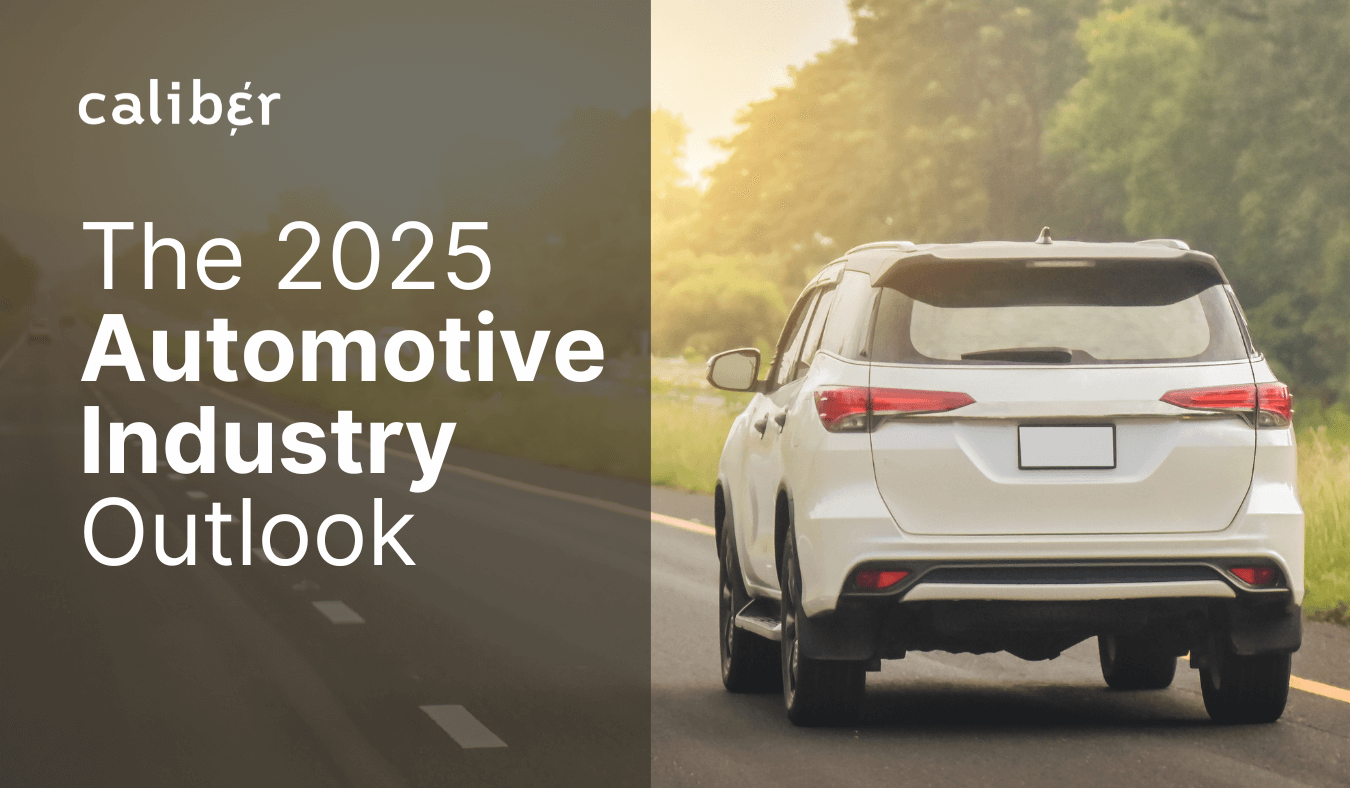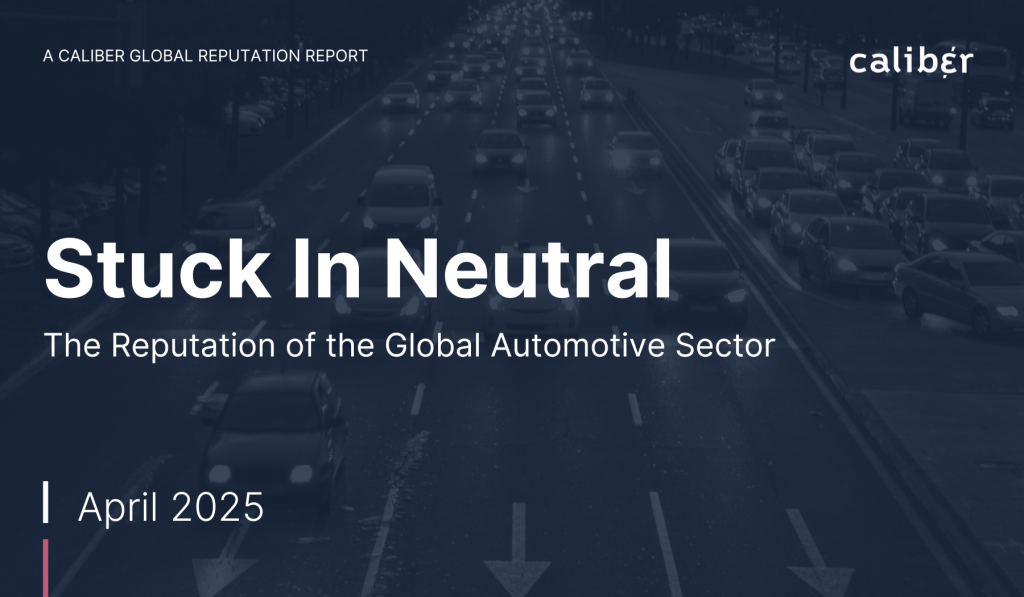
The automotive industry in 2025 is at a crossroads. Amid supply chain instability, a trade war, wavering electric vehicle (EV) enthusiasm, and rising competition, automotive companies worldwide must adapt to a fast-evolving landscape.
Caliber’s latest global report offers a revealing snapshot of stakeholder perceptions and the factors driving trust, brand loyalty and purchase decisions across key regions.
In recent years, the automotive sector received a Trust & Like Score (TLS) — Caliber’s chief metric of corporate reputation — of 63, the lowest such score among consumer-facing industries. This decline from previous years highlights eroding confidence in the sector, especially in the US and Europe, where once-dominant brands are losing ground, reputationally, to newer market entrants.
While brand loyalty remains resilient — with 38% of global respondents likely to purchase from the same car manufacturer again — trust is falling across multiple brand, reputation and and ESG performance dimensions. Even powerhouse brands like Tesla have seen their reputation deteriorate, with a TLS drop from 65 in 2022 to just 47 today.

Younger consumers (ages 18–24) tend to rate car manufacturers more positively (TLS: 68), yet they also exhibit lower brand awareness and familiarity. In contrast, older cohorts (65–75) show greater awareness but reduced trust (TLS: 62), suggesting that prolonged exposure to the sector may breed skepticism.
Men display higher awareness and familiarity with car manufacturers, while women — though less familiar — tend to view the industry more favorably. But brand and reputation attributes such as offering, integrity and environmental responsibility scored higher among female respondents.
Read also: Do women want to work for the world’s top companies as much as men?
Despite early momentum, enthusiasm for electric vehicles appears to be waning. Since 2023, the number of people likely to purchase an EV has fallen from 40% to 36%. Cost, battery performance and inadequate charging infrastructure continue to pose significant barriers to widespread EV adoption.
Consumers today are prioritizing practical over idealistic concerns:
Chinese EV manufacturers such as BYD, Xpeng, and Zeekr are gaining significant traction. In the US, their vehicles outperform domestic competitors across metrics like battery life, technology and price. In China, local brands dominate consumer preference — 71% say their next EV will be Chinese-made, up from 62% in 2024.
American automotive companies, including Tesla, Ford and General Motors, have seen a sharp decline in perception, particularly in their home market. Tesla’s fall has been most dramatic, with its brand Trust & Like Score now well below the US average.
Manufacturers like BMW, Volkswagen, Mercedes-Benz and Toyota continue to enjoy a strong global presence. While they face competition from Chinese brands, their engineering credibility and emotional connection with consumers sustain their position.
Around 32% of global respondents say that political and human rights issues in China make them view Chinese car manufacturers less favorably. However, this sentiment does not always translate into reduced purchase intent, highlighting a growing disconnect between ethical concerns and consumer behavior.
Musk’s polarizing political activity, including ties to the Trump administration, has further damaged Tesla’s reputation in Western markets. Over 40% of respondents in the UK, France and Germany now view the brand less favorably due to Musk’s public persona.
US respondents express concerns over the impact of protectionist policies, including tariffs and rollback of EV incentives:
With consumers placing higher value on dependability and recalls avoidance, automotive companies must elevate their product reliability standards.
Resolving issues around battery life, range anxiety, charging infrastructure and cost is key to regaining EV momentum.
With over 40% of global consumers undecided about their next car purchase, brands have a golden opportunity to influence this swing segment through practical, benefits-driven messaging.
Automotive companies must build on existing loyalty by enhancing customer service, transparency and recall-related communication.
Legacy car makers must lean into innovation, match competitive pricing and leverage their brand heritage and after-sales support to counter the Chinese surge.
Read also: What Businesses Keep Getting Wrong About Trust — and How They Can Fix It
The automotive sector is in flux. With emerging players shaking up legacy hierarchies, EV enthusiasm dipping, and trust declining, manufacturers must evolve — or risk irrelevance. Those who meet consumers where they are—pragmatic, skeptical, and digitally savvy — will be best positioned to lead the industry into its next era
Track automotive industry trends in real-time with Caliber’s stakeholder intelligence platform. Contact us to learn how leading automotive brands stay ahead of shifting perceptions.
The automotive industry includes all businesses involved in designing, manufacturing, selling, and servicing vehicles.
According to IBIS World, it’s valued at around $2.9 trillion, making it one of the largest global sectors. In 2024, global car sales reached 74.6 million units, marking a 2.5% increase compared to 2023.
Innovation, regulation, consumer trust and competition from emerging markets.
Top-scoring brands based on Caliber’s 2025 Trust & Like Score (TLS) include:
Note: This ranking reflects only companies included in the Caliber 2025 Automotive Reputation Report. Scores are based on stakeholder perceptions and are not globally adjusted. For more information download the full report.
In 2025, the most pressing challenges include:
Follow Caliber
Get the results of our latest research directly in your inbox!